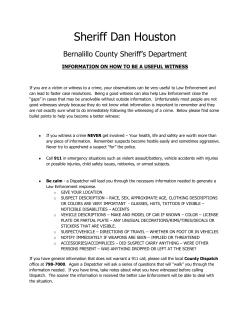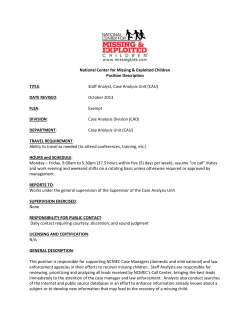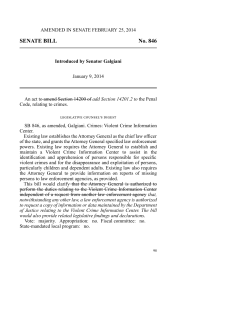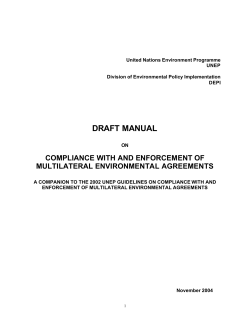
What is unauthorised development?
This leaflet is a simple guide to understanding what planning enforcement is and how it operates. It is not intended as an interpretation of planning law but rather as a practical guide on what to expect if you are involved, either as a complainant or as a respondent, in the planning enforcement process What is unauthorised development? How do I make a complaint? Any development which requires planning permission and does not have that permission, or which is going ahead in breach of the specific conditions set out in its planning permission, is classed as ‘unauthorised development’. What is planning? The term “development” potentially covers a wide range of activities, such as: • change of use of a property, (for example converting a shop to an office), • erection of signs or advertisements, • works on a building that is protected because of its historic or architectural value. If you think someone is developing or using land without, or contrary to, planning permission the first step is to contact the planning authority concerned. When doing this you need to set out - in writing why you believe this to be the case. When reporting a suspected breach of planning control, it is helpful if you have as much information as possible about the current and previous situation e.g. the exact address, when activities started, the nature of the building works or use and the names, addresses and contact details of the known owners or other persons responsible. It is recommended that you state when writing to the planning authority that you are making a written representation under section 152 of the Planning and Development Act. Planning plays an important role in our society. It enables us make the best use of our resources and allows necessary and worthwhile development to go ahead. At the same time it ensures that the environment and heritage of our towns, cities and countryside is protected. Planning authorities control the location, amount and type of development by deciding on planning applications. Everyone has a right to comment on local planning matters, and to shape the planning and development of their area. What is planning enforcement? Good planning decisions are key to our quality of life. Planning enforcement ensures that good decisions taken at the planning stage are actually carried out in the finished building or development. It deals with those who flout the law by ignoring, or not complying with, the planning process. Who is responsible for Planning and Planning Enforcement? The planning system is operated, on the ground, by the county, city, borough and town councilsgenerally referred to as local authorities. These local authorities are generally responsible for granting individual planning permissions and for operating an enforcement regime to deal with unauthorised development. The term ‘planning authorities’ is often used when local authorities take decisions in relation to planning cases. Where any activities need planning permission and don’t have it, or if the work is not being carried out in accordance with the permission that was previously granted, then it is an unauthorised development. The carrying out of unauthorised development is an offence and any person who has carried it out may be subject to enforcement proceedings. Enforcement is simply the planning authority’s way of making sure that unauthorised development becomes compliant with planning law. Planning enforcement action can only be taken when something has been done without the appropriate permission or consent. It is important to appreciate that planning enforcement action cannot be taken if the work carried out does not require permission/ consent in the first place, such as: • A change of use of a structure where the change is not material • Developments of a minor nature, such as a small extension to a house or the installation of solar panels on the roof of your house. There are usually certain thresholds relating to, for example, size or height. Where these thresholds are exceeded, the exemptions no longer apply. The knowledge and information held by individual members of the public and, for example, residents’ groups can be very helpful. The planning authority will have information in its own records and your information can add to this. What does a planning authority do when it receives a complaint? establishes, having carried out an investigation that unauthorised development is being carried out which is not trivial or minor, and the person carrying out the development does not move to remedy the situation (e.g. by removing the offending development or by applying for permission) the planning authority must take in general take further action. (The law provides that the planning authority would have to have a compelling reason for not taking further action in such a case). Further action will normally take the form of an Enforcement Notice requiring the person concerned to rectify the position. The planning authority should, where possible, reach its decision on further action within 12 weeks of sending the Warning Letter. The planning authority should also inform the person who made the complaint of what action is being taken. A summary of the process is set out in the table below: Timescale for Warning Letter Process When it receives a complaint, a planning authority is generally required to issue a warning letter, unless it considers the complaint to be frivolous or without substance or foundation. Action Timescale Written Complaint Received by planning authority Start The warning letter must inform the person concerned that it has come to the attention of the planning authority that unauthorised development may be being carried out, and must offer the person concerned an opportunity to reply, within a 4 week period. Warning Letter Issued Within 6 weeks later Response from alleged unauthorised developer Within a further 4 weeks Local Authority Reply to Complainant Within a further 2 weeks The planning authority must then carry out an investigation into the alleged unauthorised development. Where the planning authority Decision taken by planning Within 12 weeks if at all authority on whether further possible action is required There is an exception to this timetable where the planning authority believes that urgent action is required. In these cases it may move immediately to issue an Enforcement Notice without issue of a warning letter. In such circumstances, the person who made the complaint will be advised within two weeks of the issue of the notice. What’s in an enforcement notice? An Enforcement Notice states: • If the development is being carried out without planning permission, that it must stop; • If the development has planning permission but work is not being carried out in accordance with it, that steps have to be taken to ensure the develop is in line with the planning permission; • that certain steps are to be taken within a specified period. This could include the removal, or alteration of any structure; stopping the use of land; or returning land to its previous condition before the unauthorised development began; • that where these steps are not taken within the period stated, the person may be guilty of an offence. Then the planning authority may enter the land and do the work itself. The owner or developer involved will have to pay the cost of this work. The owners or developer may have to pay other costs involved with taking the enforcement action What are the penalties for non -compliance with the Enforcement Notice? Where a person does not comply with an Enforcement Notice the planning authority can take the matter to Court. The penalties for breaches of the planning law depend on the nature of the offence but, if found guilty, may result in a criminal conviction and a fine and/or a prison sentence. Are there any alternative ways to stop unauthorised development? A planning authority can apply to the Circuit Court or the High Court for an ‘injunction’ to prevent an unauthorised development from being carried out, or from beginning. Individuals or groups can also apply for an injunction, even if the planning authority hasn’t taken this step. If I am unsure whether my development requires planning permission, how can I avoid becoming subject to enforcement measures? Certain types of development are exempted from planning control, that is, they don’t need planning permission. Planning regulations contain detailed lists of developments that don’t need planning permission. However, if you are still uncertain about whether, or not, a particular development requires planning permission, it is possible to ask the planning authority for a written answer. You’ll have to supply all the necessary information and the planning authority may charge a fee for this service. Unless the planning authority requires additional information, it has four weeks to respond giving reasons for its decision. Can unauthorised development ever be regularised / brought within the planning system? Genuine mistakes can be made about the need for planning permission. If you discover that you have undertaken unauthorised development, you may apply for permission to retain it. However, this approach should not be relied on in order to avoid seeking planning permission before starting work as you may not be granted planning permission for retention or you may be required to carry out costly modifications. The application fee is also much higher than the fee for an application made before development starts. Permission for retention does not automatically absolve you from prosecution if enforcement action has already been initiated. It is also important to note that retention permission may be sought only in limited circumstances. Are there any cases where enforcement action cannot be taken against an unauthorised development? Any legal action taken by the planning authority against unauthorised development, with the exception of quarrying operations and peat extraction, must be started within seven years of the breach of the planning law taking place. Irrespective of the time that has elapsed, an Enforcement Notice can be served, or an injunction can be sought where a person has failed to satisfy a planning condition concerning the use of land. ACTION The leaflets in this series are: A Guide to Planning Permission Making a Planning Application Commenting on a Planning Application Building A House The Planning Issues Doing Work around the House The Planning Issues Agriculture and Farm Development The Planning Issues Planning for the Business Person The Development Plan Environmental Impact Assessment Making a Planning Appeal A Guide to the Building Regulations A Guide to Architectural Heritage Archaeology in the Planning Process LAW PLANNING PL 1 PL 2 PL 3 INFORMATION PL 4 PL 5 ENFORCEMENT PLANNING PL 6 PL 7 PL 8 PL 9 PL 10 PL 11 PL 12 PL 13 AUTHORITY DEVELOPMEN UNATHORISED PERMISSION AUTHORITY ENFORCEMENT COMPLAINT UNAUTHORISED PL 14 Where can I find out more about planning enforcement? A Guide to Planning Enforcement A more detailed user’s guide to planning enforcement (Planning Enforcement in Ireland) is available on the Department’s website, www.environ.ie. The law governing the planning system, including enforcement, is set out in the Planning and Development Acts 2000-2012 and the Planning and Development regulations available online on www.environ.ie or for purchase from the Government Publications Sales Office, Sun Alliance House, Molesworth Street, Dublin 2. Tel: 01-6793515. ACTION LAW INFORMATION ENFORCE PLANNING PL 14 November 2012
© Copyright 2025












